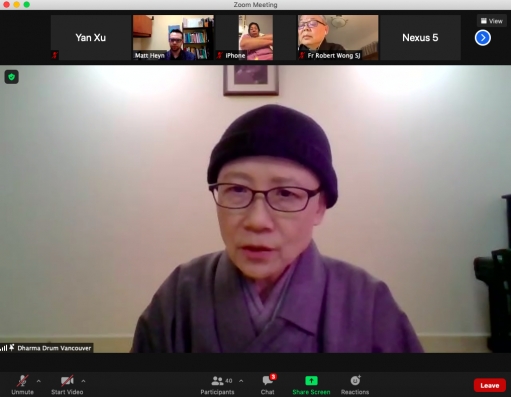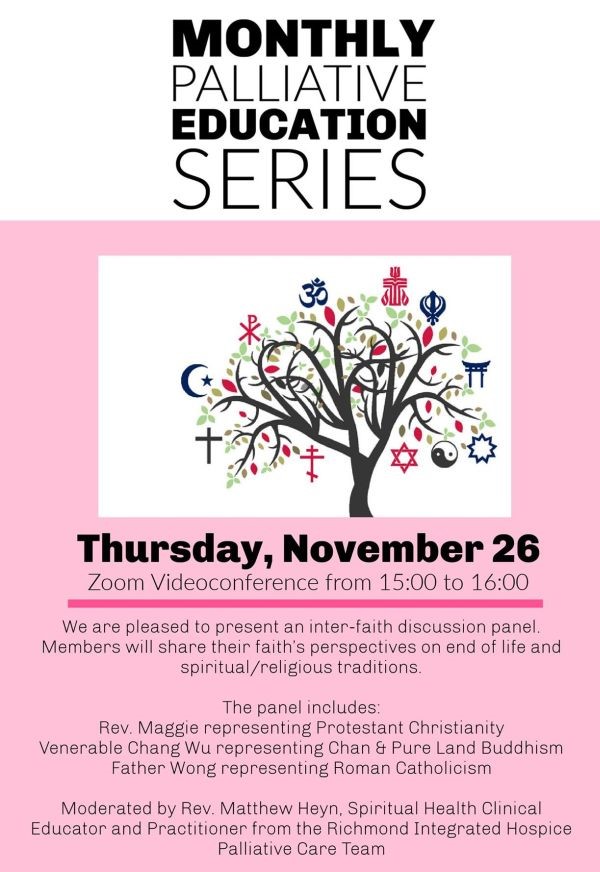Interfaith Hospice Palliative Care Conference
 On November 26, 2020, Vancouver Coastal Health and the Richmond Integrated Hospice Palliative Care Team held an Interfaith Hospice Palliative Care conference from 3:00 to 4:00 pm. This online conference was part of a series of educational courses for health care workers with about 40 participants. Ven. Chang Wu, director of Vancouver Chan Meditation Centre, Rev. Maggie Watts-Hammond of United Church of Canada, and Fr. Robert K Wong of Roman Catholic Church shared religious based ideas, beliefs, rituals, and practices on palliative care and hospice, and finally, a Q&A session with health care workers.
On November 26, 2020, Vancouver Coastal Health and the Richmond Integrated Hospice Palliative Care Team held an Interfaith Hospice Palliative Care conference from 3:00 to 4:00 pm. This online conference was part of a series of educational courses for health care workers with about 40 participants. Ven. Chang Wu, director of Vancouver Chan Meditation Centre, Rev. Maggie Watts-Hammond of United Church of Canada, and Fr. Robert K Wong of Roman Catholic Church shared religious based ideas, beliefs, rituals, and practices on palliative care and hospice, and finally, a Q&A session with health care workers.Rev. Matthew Heyn, as moderator of this conference, invited Ven. Chang Wu to expound on the belief and attitude towards death from a Buddhist perspective. Ven. Chang Wu explained that Buddhists do not regard death as the end of life; this period of life is part of a journey in our countless periods of life, with each period of life having its own meaning and purpose. Thus, Buddhist hospice palliative care aims to help patients move forward to the next life peacefully. Next, Rev. Maggie explained that Christians view death as homecoming and to rest in peace in God's embrace; there is neither loneliness nor fear with God's companionship along the way. She also emphasized that in the final stages of life, hospice or palliative care is irreplaceable. Fr. Wong agreed that death is the beginning of a new life and believed that God who created the world is the only one who is eternal.
 The three keynote speakers also elaborated on the practice of hospice palliative care. Buddhists guide the patients to let go of all attachments and to chant the name of Amitabha Buddha so that they will be at peace; with the compassionate vows of the Buddhas and the Bodhisattvas, they will be reborn in the Pure Land. Those with strong foundation in Chan meditation can do contemplative visualization as an alternative when facing death. Similar to Buddhist end-of-life chanting, Christians and Catholics pray, read scriptures, or sing hymns. The difference is that Christian or Catholic dying patients undertake confession and repentance in front of a priest or father to achieve salvation from God in order to enter heaven. Although differ in practices, all three religions place the same emphasis on death and provide religious rituals or spiritual care to the dying as well as comfort to their family.
The three keynote speakers also elaborated on the practice of hospice palliative care. Buddhists guide the patients to let go of all attachments and to chant the name of Amitabha Buddha so that they will be at peace; with the compassionate vows of the Buddhas and the Bodhisattvas, they will be reborn in the Pure Land. Those with strong foundation in Chan meditation can do contemplative visualization as an alternative when facing death. Similar to Buddhist end-of-life chanting, Christians and Catholics pray, read scriptures, or sing hymns. The difference is that Christian or Catholic dying patients undertake confession and repentance in front of a priest or father to achieve salvation from God in order to enter heaven. Although differ in practices, all three religions place the same emphasis on death and provide religious rituals or spiritual care to the dying as well as comfort to their family. There were many questions about Buddhism in the final Q&A. Ven. Chang Wu took this opportunity to clarify the misconception that some Buddhists have when refusing painkillers, thinking that enduring pain could eliminate past bad karma. She also explained in detail regarding the Buddhist practice of not touching a dead person's body in the first 8 hours after death. This hour-long conference presented an opportunity for attendees to understand the similarities and differences between Buddhism and Christianity in the teachings and practices of hospice palliative care.
Text & Photos: Dharma Drum Vancouver Centre
Translation: Hsiao Chen-An
Editing: Yeh Shujen (葉姝蓁); Leefah Thong
